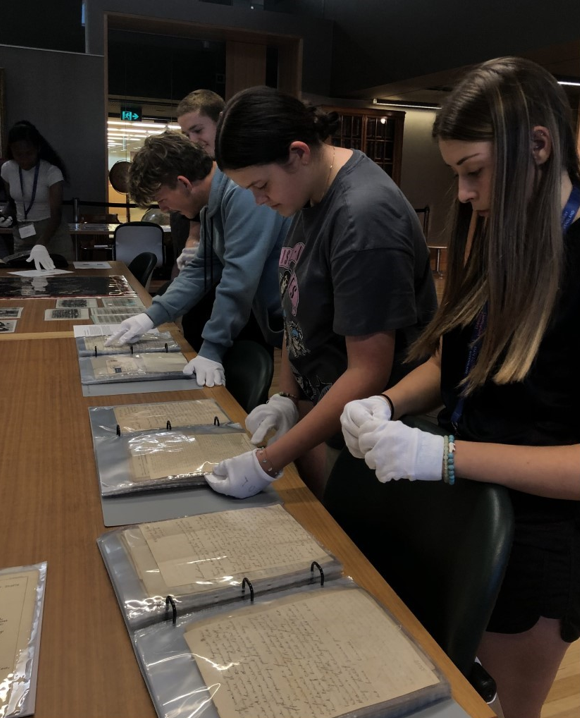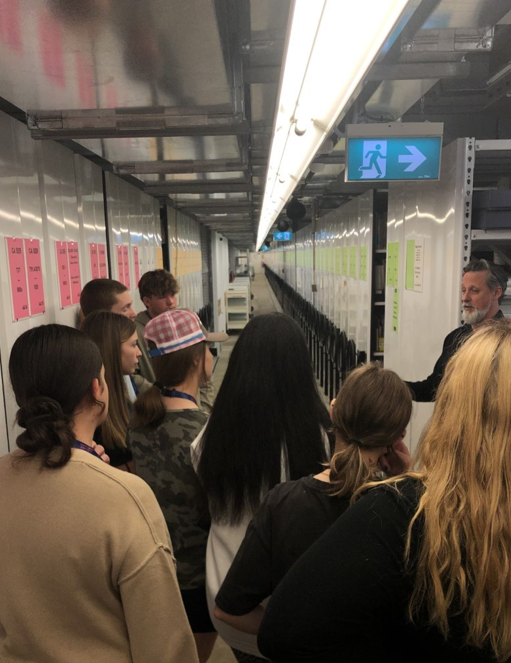2023 Young Researchers Program
On Monday 18 September, State Library of Queensland opened its doors to 10 regional students and 2 teacher chaperones, signalling the start of the week-long practicum component of the first-ever Young Researchers Program.
State Library’s Young Researchers Program is delivered in memory of Gloria Hamilton through the generosity of Mrs Caroline and Mr Keith Hamilton, as a tribute to Keith’s mother Gloria. Gloria grew up in Cloncurry, then boarded at St Anne’s College in Townsville. Following her graduation in Year 10, she went on to work for North Queensland Cement Ltd., establishing a 40-year career at the company. Gloria attributed her achievements to the valuable experiences she gained from attending school in Townsville and being exposed to a broader range of opportunities during her formative years.
As a tribute to Gloria, this program offers young people from regional areas the opportunity to embark on new experiences and expand their horizons. This year we welcomed students from Cloncurry, Mt Isa, and Munduberra.

Participants engaging with State Library's collection of military diaries through a White Gloves Experience.
Throughout the week, the students embraced an array of cultural and educational experiences. With the expert guidance of State Library librarians and staff, students delved deep into State Library's online resources and extensive physical collection to research their chosen topics - and made some very interesting discoveries.
But it wasn't all research! While in Brisbane, students took part in an array of experiences beyond the walls of State Library, including guided tours of the Gallery of Modern Art (GoMA), Queensland Museum, and Anzac Square Memorial Galleries; a trip to Cirque Bon Bon at Brisbane Festival; and an exploration of all that is on offer at the University of Queensland.

Participants taking part in a repository tour with Access Assistant Tam Patton.
Read students’ first-hand accounts of their experiences below:
Paige Marshall
I decided to participate in the Young Researchers Program as I believed it would give me many opportunities to try different things and explore what I might like to do in the future.
I chose the topic of rural/regional medicine accessibility compared to metropolitan accessibility. I chose this topic because I have firsthand experience in this field, and I hope to go into the medical field when I am older. Now I work in the local pharmacy in Mount Isa which has contracts supplying medications to people in Gidgee Healing, Mornington Island, Boulia and Dajarra. Working and supplying for these people means I hear many stories of how people can’t get into doctors to get a new script.
During this program I feel I have developed the skills to create my own research strategy and have learnt the skills of deciding whether a source is reliable and important to my research. I have also developed a large amount of people and teamwork skills working with people I don’t know and have only just met and been thrown into a group with. I became more independent because I had to be responsible for myself and what I was doing.
Georgia Nolan
I chose to explore Australia’s involvement in WWII, and specifically how the bombing of Darwin affected Australia’s war efforts and how it impacted people’s daily lives. I have previously been interested in the affects and events of WWII in other countries, however I had not learnt much about Australia. My primary source was fortnightly meeting minutes written by Elise Doris Dunn for the West End Air Raid Precautions. This book includes a copy of the 1939 Bill "to authorize the carrying out by Air Raid Wardens of Their Powers and Duties During the Period of any Air Raid” and includes 3 flyers for victims of air raids to fill out.
Emily van der Veen
I decided to participate in the Young Researchers Program because I believed that this would be a once in a lifetime opportunity that could help open more pathways for my future. I also believed that it would be a great learning opportunity.
The research topic I chose to explore was how Queensland Mount Isa Spinifex State College changed in since the 1900s. I chose this topic because I believed that it was meaningful, and a topic of great interest. I also believed that it was a topic that other people not just myself would find of interest and be able to connect to.
I used many resources to conduct my research of the topic of the school now known as Spinifex State College. Firstly, I used primary sources such as year books from the years of 1958, 1968 and 1998 to look of how some things of the school had changed over the years. I learnt that Mount Isa High and Kalkadoon State High merged in 2003 to form Spinifex State College Senior Campus.
Thelma Van der Mescht
The Young Researchers Program is a fantastic experience where you can learn many new different things while stepping out of your comfort zone. I had never experienced the big city culture or had been to Brisbane before. This allowed me to experience a surrounding unlike my own which helped my learn so many things I didn’t know existed and I now know numerous things to help me within my schooling years.
I ended up researching about the forever evolving changes of earth and how society today has come to promote global warming. I choose this topic because I am interested about the earth we live on, and I would like to learn how to help save our planet by looking after it rather than destroying it.
Gabrielle Darke
I decided to participate as a way to learn more about Renaissance artwork particularly Leonardo da Vinci’s artwork and this was a perfect opportunity to do it as Mount Isa does not have the resources to do that. I’ve always been interested in the fine arts and how famous painters decided to create their artworks. I’ve also been interested in Leonardo da Vinci’s works since I was taught about it in History in Grade 8. I was hoping to learn how Leonardo da Vinci was influenced into making his artworks which I did succeed at as I found out that most of his artworks were influenced by his perspective on biblical figures.
Zane Sullivan
I participated in the Young Researchers Program because I wanted to learn more about my great, great grandfather Ernest Eglington. I learnt how to use Trove and learnt that he gone around Australia asking the Indigenous people how they say different words in their language. He became a police magistrate after becoming a policeman.
Rieley Gibson-Reed
I’m a young researcher from Mundubbera, the citrus capital of Queensland; a dry landscape with large areas of bush and dirt. I’m a part time boxer, wrestler and already enlisted as a future member of the Australian Defence Force.
I chose to explore more into the Holocaust as I had just recently finished learning about it in selective history. As a subject I found it somewhat interesting and decided that I wanted to learn more about certain parts.
My most memorable experiences were the museum tours, the dinosaur exhibit and the White Gloves experiences and being able to have a close look at items and artefacts.
This program helped me develop my teamwork skills. As the only student from Mundubbera I had to make friends with new people and learn to work with people I knew nothing about. Don’t be afraid to ask what you want to know, and make sure to talk to others as they may know more information that you want to know.
Payton Saunders
I decided to spend my time at State Library researching Ancient Greek mythology. I enjoyed learning about how the Greek Gods overthrew the Titan Kronos. One highlight for me was visiting the Antiquities Museum at University of Queensland as they had artefacts related to Zeus, son of Kronos.
Jayden Sherwood
During my time here I’ve learnt how to make friends with new people quickly and how to use State Library’s resources to do good research. I chose to research my great grandfather Arthur George Sims who served in World War Two and was able to find the location of his burial site in New South Wales.
I’ve grown by improving my social skills because before I came down, I would barely make any friends and would sit by myself, but now I believe I’m better at making friends. I have access to State Library’s resources now and it will help improve my work and research skills for future school assignments.
Sophia Fonu
During the Young Researchers Program I chose to research the history of Fijian medicine. I learnt to believe in myself more and be passionate about what I love doing and not worry so much about what other people think.
I had never been on a plane before so that was a big challenge for me, especially without my family, so I overcame my fear of aeroplanes. I enjoyed the museums we went to where we got to see dinosaurs and marine animals.
You shouldn’t let this opportunity go to waste. It’s a really fun opportunity for anyone and everyone and you get to meet great supportive carers who are right by your side all the way.
Feedback from teacher chaperones, Jemma and Victoria, also served as a testament to the program's value.
This was an opportunity that students wouldn’t normally get in a regional school in Mount Isa – not just the opportunity to come to Brisbane and experience what life is like in the city, but also to go behind-the-scenes at State Library, enhance their research skills and have some cultural experiences. Being from a small town, it’s great for students to broaden their horizons and see what’s out there.
The program has exceeded my expectations. It was extremely well organised, and we had a lot of opportunities to not only gain research skills, but to do cultural activities which the students really appreciated and enjoyed. I noticed many of the students were shy and reserved at the start, which is understandable because this was such a new experience and students came from multiple different schools… but as the week progressed, everyone became so comfortable with each other, and everyone was mingling as one whole group, which was so awesome.
We are so proud of these students for the courage, curiosity, and dedication that they demonstrated throughout the week, and look forward to delivering the Young Researchers Program again in 2024. Find out more about the program here.
Comments
Your email address will not be published.
We welcome relevant, respectful comments.